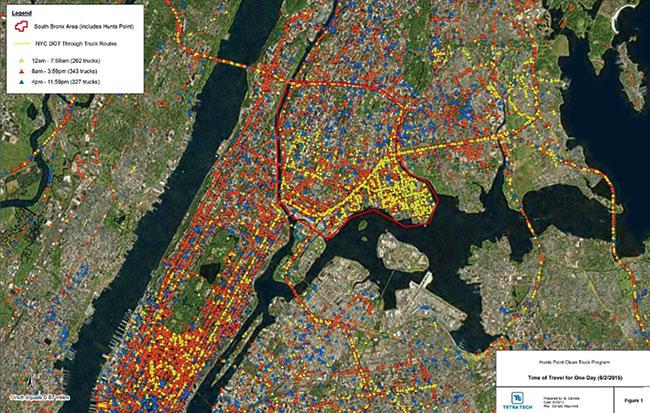Driving Decisions With Data Dashboards: Cleaning up the Core of the Big Apple
Harnessing the power of data throughout the project life cycle

Driving Decisions with Data Dashboards
Across Tetra Tech’s markets, nearly all clients share the need for actionable information that can drive decision making. Big data began bursting onto the scene some 25 years ago, inundating our information-hungry clients with megabytes and gigabytes of facts and figures that soon became a flood of petabytes and zettabytes. Managers thirsty for relevant intelligence were drowning in oceans of data, wondering what was important, what was essential, and what was urgent information.
In response to the need for timely and relevant information that can be analyzed, Tetra Tech employees from many facets of engineering, science, and technology began to apply methodologies to identify, analyze, and report mission-critical information. This article explores some of the ways we are Leading with Science® by using innovative data analytics techniques and digital dashboards—tools that integrate, display, and analyze key data—to help our clients gain insights that allow them to improve customer service and efficiency, make decisions in real time, and even use predictive analytics to steer toward the best future outcome.
Cleaning up the core of the Big Apple
New York City eats, sleeps, moves, and works by truck—all kinds of trucks of every size imaginable. Recognizing that older trucks can belch unhealthy levels of black smoke into the urban air, the New York City Department of Transportation (NYCDOT) conceived a unique and engaging initiative six years ago to address the problem. The initial concept for the Hunts Point Clean Trucks Program (HPCTP) was to target truck owners serving the Hunts Point and Port Morris communities of the South Bronx, which has the state’s highest incidence of respiratory disease. The program would offer attractive rebate incentives to scrap older, heavy-polluting trucks (e.g., up to $30,000 for a Class 8 diesel) in favor of new diesel, diesel-hybrid, compressed natural gas, or battery electric trucks. Rebates for installing exhaust retrofits would be determined on a case-by-case basis.
Tetra Tech’s team, led by Air Quality Director Eddy Huang, secured the initial HPCTP contract in 2011 and recently received a 5-year extension. The NYCDOT secured a $24-million grant through the U.S. Department of Transportation’s Congestion Mitigation and Air Quality Improvement Program to offset the cost of truck replacements and retrofits. Another $600,000 was secured under the City of New York’s Vision Zero Action Plan to fund early adoption of truck safety enhancements to improve vehicle, bicycle, and pedestrian safety.
The program team conducts truck owner outreach, truck fleet analyses, cost-benefit analyses (i.e., cost per pound per ton of reduced emissions), and truck use compliance tracking and operates a customer service helpline. They manage vendor and grant applicant contracts; monitor vehicle scrappage; and report on program compliance, enforcement, and emissions reduction. “The HPCTP has replaced, retrofitted, or scrapped around 600 older, heavy-polluting diesel trucks from the South Bronx and NYC—along with 28 older, diesel-fueled portable refrigeration units,” said Eddy.
An automated monitoring system collects truck data, logging the location, engine status, and speed of all participating vehicles. The data collection, management, and reporting effort involves large volumes of structured and unstructured data generated daily. The team has focused on database development and data trend studies and conducts automatic vehicle locator data analysis for NYCDOT’s compliance enforcement program. Reports include route maps, tabular data, and time-series graphs.
The data overlay on a map of portions of New York City and New Jersey represents the 24-hour movement of approximately 500 trucks funded under the NYCDOT HPCTP; monitoring includes peak and off-hour vehicle use, vehicle idling, and traffic speed for private fleets.
HPCTP’s benefits are extensive. Truck owners get new, emission-compliant trucks that require less maintenance and use less fuel, providing big cost savings. Their clients see proactive businesses that are implementing greener supply chain policies. Pedestrians, bicyclists, and other vehicles have a greater chance of avoiding and surviving accidents with trucks equipped with enhanced safety features. And the greater New York City area has seen a reduction in harmful emissions resulting from replacing, retrofitting, and scraping older heavy-polluting trucks—a win for all parties.
The HPCTP won a C40 Cities 2017 Award in the Mobility category. When informing our team of the award, Susan McSherry, NYCDOT Alternative Fuel Program manager, noted that the HPCTP’s success “is not possible without the great team at Tetra Tech.” Read more at tetratech.com/HPCTPaward.
The volume of data generated in our industry grows every day. Our challenge is to sift through vast data sets, identify critical information needed to make meaningful decisions, and present that information in a simplified, usable format. Throughout its markets—from disaster recovery to water, environment, energy, aviation, and beyond—Tetra Tech helps clients harness the power of their data to boost success throughout project life cycles.

